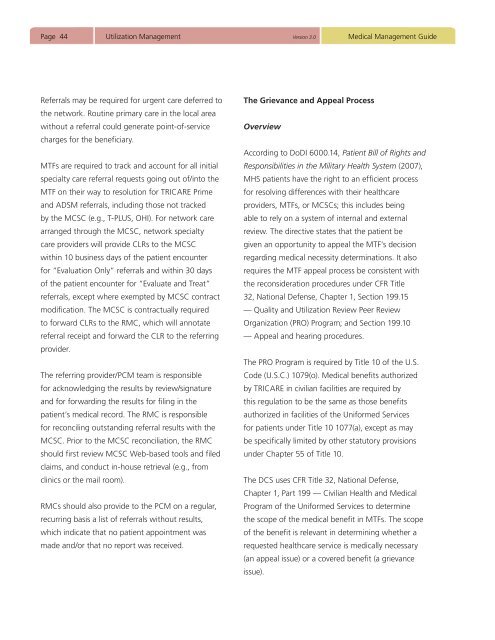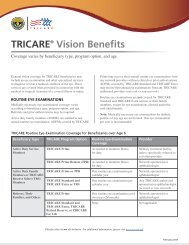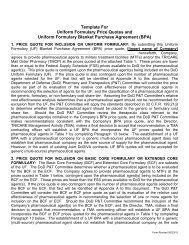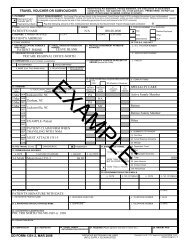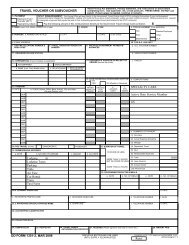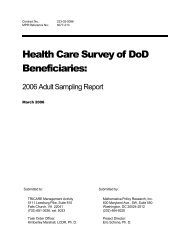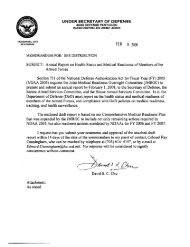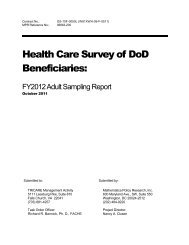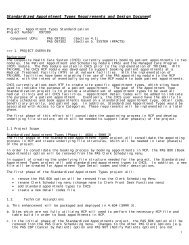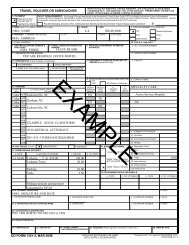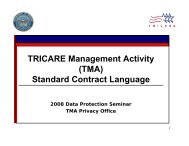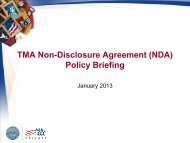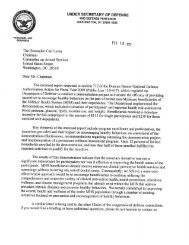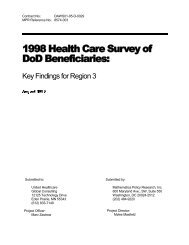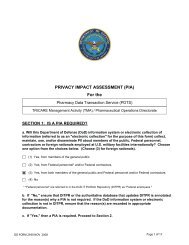Medical Management Guide, 2009, Version 3.0 - Tricare
Medical Management Guide, 2009, Version 3.0 - Tricare
Medical Management Guide, 2009, Version 3.0 - Tricare
- No tags were found...
Create successful ePaper yourself
Turn your PDF publications into a flip-book with our unique Google optimized e-Paper software.
Page 44Utilization <strong>Management</strong> <strong>Version</strong> <strong>3.0</strong><strong>Medical</strong> <strong>Management</strong> <strong>Guide</strong>Referrals may be required for urgent care deferred tothe network. Routine primary care in the local areawithout a referral could generate point-of-servicecharges for the beneficiary.MTFs are required to track and account for all initialspecialty care referral requests going out of/into theMTF on their way to resolution for TRICARE Primeand ADSM referrals, including those not trackedby the MCSC (e.g., T-PLUS, OHI). For network carearranged through the MCSC, network specialtycare providers will provide CLRs to the MCSCwithin 10 business days of the patient encounterfor “Evaluation Only” referrals and within 30 daysof the patient encounter for “Evaluate and Treat”referrals, except where exempted by MCSC contractmodification. The MCSC is contractually requiredto forward CLRs to the RMC, which will annotatereferral receipt and forward the CLR to the referringprovider.The referring provider/PCM team is responsiblefor acknowledging the results by review/signatureand for forwarding the results for filing in thepatient’s medical record. The RMC is responsiblefor reconciling outstanding referral results with theMCSC. Prior to the MCSC reconciliation, the RMCshould first review MCSC Web-based tools and filedclaims, and conduct in-house retrieval (e.g., fromclinics or the mail room).RMCs should also provide to the PCM on a regular,recurring basis a list of referrals without results,which indicate that no patient appointment wasmade and/or that no report was received.The Grievance and Appeal ProcessOverviewAccording to DoDI 6000.14, Patient Bill of Rights andResponsibilities in the Military Health System (2007),MHS patients have the right to an efficient processfor resolving differences with their healthcareproviders, MTFs, or MCSCs; this includes beingable to rely on a system of internal and externalreview. The directive states that the patient begiven an opportunity to appeal the MTF’s decisionregarding medical necessity determinations. It alsorequires the MTF appeal process be consistent withthe reconsideration procedures under CFR Title32, National Defense, Chapter 1, Section 199.15— Quality and Utilization Review Peer ReviewOrganization (PRO) Program; and Section 199.10— Appeal and hearing procedures.The PRO Program is required by Title 10 of the U.S.Code (U.S.C.) 1079(o). <strong>Medical</strong> benefits authorizedby TRICARE in civilian facilities are required bythis regulation to be the same as those benefitsauthorized in facilities of the Uniformed Servicesfor patients under Title 10 1077(a), except as maybe specifically limited by other statutory provisionsunder Chapter 55 of Title 10.The DCS uses CFR Title 32, National Defense,Chapter 1, Part 199 — Civilian Health and <strong>Medical</strong>Program of the Uniformed Services to determinethe scope of the medical benefit in MTFs. The scopeof the benefit is relevant in determining whether arequested healthcare service is medically necessary(an appeal issue) or a covered benefit (a grievanceissue).


